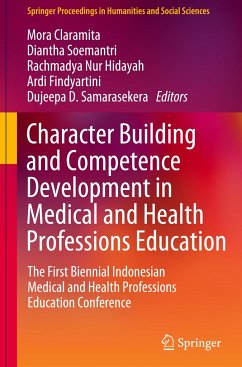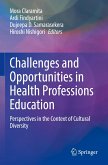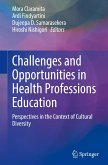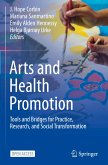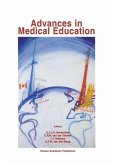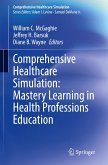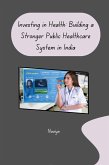Character Building and Competence Development in Medical and Health Professions Education
The First Biennial Indonesian Medical and Health Professions Education Conference
Herausgegeben:Claramita, Mora; Soemantri, Diantha; Hidayah, Rachmadya Nur; Findyartini, Ardi; Samarasekera, Dujeepa D.
Character Building and Competence Development in Medical and Health Professions Education
The First Biennial Indonesian Medical and Health Professions Education Conference
Herausgegeben:Claramita, Mora; Soemantri, Diantha; Hidayah, Rachmadya Nur; Findyartini, Ardi; Samarasekera, Dujeepa D.
- Gebundenes Buch
- Merkliste
- Auf die Merkliste
- Bewerten Bewerten
- Teilen
- Produkt teilen
- Produkterinnerung
- Produkterinnerung
This book is a collection of the best scientific research presented during the First International Conference of Indonesian Medical and Health Professions Education (INA-MHPE Conference 2022) hosted by the Departments of Medicine, Health Professions Education, and Bioethics in the Faculty of Medicine, Public Health, and Nursing at the Universitas Gadjah Mada (UGM) in Indonesia. The conference was held in co-operation with the co-hosts of Department of Medical Education at Universitas Indonesia (UI) and the Medical Education Unit in the Faculty of Medicine at Universitas Airlangga (UA), who…mehr
Andere Kunden interessierten sich auch für
![Character Building and Competence Development in Medical and Health Professions Education Character Building and Competence Development in Medical and Health Professions Education]() Character Building and Competence Development in Medical and Health Professions Education154,99 €
Character Building and Competence Development in Medical and Health Professions Education154,99 €![Challenges and Opportunities in Health Professions Education Challenges and Opportunities in Health Professions Education]() Challenges and Opportunities in Health Professions Education100,99 €
Challenges and Opportunities in Health Professions Education100,99 €![Challenges and Opportunities in Health Professions Education Challenges and Opportunities in Health Professions Education]() Challenges and Opportunities in Health Professions Education100,99 €
Challenges and Opportunities in Health Professions Education100,99 €![Arts and Health Promotion Arts and Health Promotion]() Arts and Health Promotion53,49 €
Arts and Health Promotion53,49 €![Advances in Medical Education Advances in Medical Education]() Advances in Medical Education232,99 €
Advances in Medical Education232,99 €![Comprehensive Healthcare Simulation: Mastery Learning in Health Professions Education Comprehensive Healthcare Simulation: Mastery Learning in Health Professions Education]() Comprehensive Healthcare Simulation: Mastery Learning in Health Professions Education100,99 €
Comprehensive Healthcare Simulation: Mastery Learning in Health Professions Education100,99 €![Investing in Health: Building a Stronger Public Healthcare System in India Investing in Health: Building a Stronger Public Healthcare System in India]() NaviyaInvesting in Health: Building a Stronger Public Healthcare System in India29,89 €
NaviyaInvesting in Health: Building a Stronger Public Healthcare System in India29,89 €-
-
-
This book is a collection of the best scientific research presented during the First International Conference of Indonesian Medical and Health Professions Education (INA-MHPE Conference 2022) hosted by the Departments of Medicine, Health Professions Education, and Bioethics in the Faculty of Medicine, Public Health, and Nursing at the Universitas Gadjah Mada (UGM) in Indonesia. The conference was held in co-operation with the co-hosts of Department of Medical Education at Universitas Indonesia (UI) and the Medical Education Unit in the Faculty of Medicine at Universitas Airlangga (UA), who will host the forthcoming INA-MHPEC in 2024 and 2026, respectively. This collection presents selected papers presented by health professionals and bioethicists from these leading institutions in Indonesia, focusing on the theme of character building in the context of health education for medical professionals in the twenty-first century. It considers effective learning strategies for character building, appropriate methods of character assessment, means of assessing and improving the learning environment in the community, clinics, university classes and hospitals, and addresses the role of the healthcare educator in providing resources, program evaluations, and effective medical management to support the development of healthcare professionals' characters, and their modus operandi, in the future. The book is relevant to medical and public health professionals in Indonesia, Southeast Asia, and beyond.
Produktdetails
- Produktdetails
- Springer Proceedings in Humanities and Social Sciences
- Verlag: Springer / Springer Nature Singapore / Springer, Berlin
- Artikelnr. des Verlages: 978-981-99-4572-6
- 1st edition 2023
- Seitenzahl: 272
- Erscheinungstermin: 5. Oktober 2023
- Englisch
- Abmessung: 241mm x 160mm x 21mm
- Gewicht: 576g
- ISBN-13: 9789819945726
- ISBN-10: 9819945720
- Artikelnr.: 68189575
- Herstellerkennzeichnung Die Herstellerinformationen sind derzeit nicht verfügbar.
- Springer Proceedings in Humanities and Social Sciences
- Verlag: Springer / Springer Nature Singapore / Springer, Berlin
- Artikelnr. des Verlages: 978-981-99-4572-6
- 1st edition 2023
- Seitenzahl: 272
- Erscheinungstermin: 5. Oktober 2023
- Englisch
- Abmessung: 241mm x 160mm x 21mm
- Gewicht: 576g
- ISBN-13: 9789819945726
- ISBN-10: 9819945720
- Artikelnr.: 68189575
- Herstellerkennzeichnung Die Herstellerinformationen sind derzeit nicht verfügbar.
Mora Claramita is Professor and Head of the Department of Medical Health Professions Education and Bioethics in the Faculty of Medicine Public Health and Nursing at the Universitas Gadjah Mada in Yogyakarta, Indonesia. She graduated from Maastricht University for her masters and Ph.D. degrees in Health Professions Education. She has practiced as Family Doctor since 2000 and has published many publications and books in the area of medical education and primary care. She was Fulbright Senior Scholar at the University of Iowa and FAIMER Fellow, Philadelphia, USA 2014. Diantha Soemantri is Associate Professor in medical education in the Faculty of Medicine Universitas Indonesia. She received a masters degree from the University of Dundee and a Ph.D. in Medical Education from Melbourne University. She is Chair of Master of Medical Education Program at Universitas Indonesia and also responsible for the interprofessional education of Health Sciences Cluster and Vice-Director of medical education of the Indonesian Medical Education and Research Institute (IMERI) FMUI. She has published papers in peer-reviewed journals, actively serves as Peer Reviewer for various high-impact journals, and received both international and national research grants. Rachmadya Nur Hidayah is Assistant Professor in the Department of Medical Education and Bioethics, the Faculty of Medicine, Public Health, and Nursing Universitas Gadjah Mada. She obtained a master's degree from Maastricht University and a Ph.D. in Health Professions Education from the University of Leeds in 2018. She is Chair of the clinical skills simulation at UGM. She is 2020 FAIMER Fellow Philadelphia, USA, with projects in team-based clinical skills learning. Ardi Findiyartini is Professor in Medical Education, Faculty of Medicine Universitas Indonesia, Jakarta, Indonesia. She is currently Head of Medical Education Unit and Chair of Medical Education Center IMERI at the faculty. She earned doctoral degree in medical education from Melbourne University. She has been actively involved as a resource person in the faculty development programs in Indonesia, regionally and internationally. She actively publishes and reviews scholarly works in national and international journals and active members of the international community of practices in medical and health professions education. Dujeepa Samarasekera is Senior Director at the Centre for Medical Education (CenMED), School of Medicine, National University of Singapore, and is Senior Consultant with the Ministry of Health Singapore. Dujeepa received a master degree in Health Professions Education from Maastricht University. Dujeepa received many accolades such as NUS School of Medicine Special Recognition Award as a Role Model in 2015, MILES Award given for Mentoring Innovation and Leadership in Educational Scholarship, NUS Virtues Awardfor excellence to service in the era of COVID in 2021, and NUHS Mochtar Riady Pinnacle Award for Excellence in Education in 2022. He is Editor-in-Chief of The Asia Pacific Scholar (TAPS) journal and serves on the editorial advisory boards of a number of other international education journals.
Chapter 1. Advancing programmatic assessment using e-portfolio for undergraduate medical education: A national development report (Utomo, P.S., Greviana, N., Sumunar, D.S.E.W., Soemantri, D., Claramita, M.).- Chapter 2. An exploration of nursing students' experiences using case report design: A case study (Fitriyyah, Y.N., Annurahman, A., Aulawi, K., Alda, A.K., Susilo, A.P.).- Chapter 3. Assessment and evaluation of block of disaster preparedness: Implementing problem-based learning in clinical and public health management (Solikhah, A., Qomariyah, N., Indarto, B.P., Nisa, A.K.).- Chapter 4. Case-based interprofessional learning to increase health professions students' perceptions of communication and teamwork (Hermasari, B.K., Asrini, N.E.).- Chapter 5. Character development and learning activity in medical education: Lecturer perception (Rahmadani, M.F., Izzah, A.F., Munawaroh, S., Hastami, Y., Wiyono, N.).- Chapter 6. Correlation between self-directed learning readinessand structured oral case analysis test scores (Widiarti, C., Pribadi, FW., Findyartini, A.).- Chapter 7. Developing clinical skill videos as an instrument to assess the Objective Structured Clinical Examination (OSCE) examiners' effect (Purnajati, O.G., Hidayah, R.N., Rahayu, G.R.).- Chapter 8. Differences in perceptions of values, roles and responsibilities, communication, and teamwork regarding interprofessional education (IPE) between medical, midwifery, and psychology students (Pamungkasari, E.P., Probandari, A., Parwatiningsih, S.A., Agustina, L., Sumardiyon., Asmara, F.Y., Kristina, T.N.).- Chapter 9. Dysfunctional coping strategies by medical students with stress in the COVID-19 pandemic (Rochmanti, M., Sari, D.R., Sakina., Atika., Sugiyatmi, T.A.).- Chapter 10. Exploration of interprofessional education learning methods in achieving collaborative competencies during Covid-19 pandemic (Ghurafa, KA., Maftuhah, A., Hermasari, BK.).- Chapter 11. Feasibility of peer assessment in evaluating medical students' professional behaviour in the early years of their medical journey (Samarasekera, D.D., Shing L.S., Ping Y.S., Denise GOH.).- Chapter 12. Formative Objective Structured Clinical Examination (OSCE) as a learning tool and predictor of high-stakes OSCE (Wahyuningsih, K.A., Prastowo, N.A., Juliawati, V.D.J., Ardianto, C.).- Chapter 13. From burnout to resilience during online learning in the pandemic era: A qualitative study on medical students (Sari, S.M., Wulandari, A., Kristiana, R., Nurfuadi, L., Yuhana, G.P., Ibrahim, M.F.).- Chapter 14. Health professions education journal club: Faculty-led initiative in promoting community of practice (Razak, S.S.A., Nadarajah, V.D., Veasuvalingam, B.).- Chapter 15. "How intense should be a nurturing program physician mindset?" (Nurokhmanti, H., Utomo, P.S., Susilo, A.P., Prihatiningsih, T.S.).- .- Chapter 16. Implementation of design principles for virtual patient simulation in interprofessional education (Sumunar D.S.E.W., Stathakarou, N., Kononowicz A.A., Karlgren, K.).- Chapter 17. Medical student organization activities and self-directed learning readiness (SDLR): A cross sectional study (Maryam, S., Matuhah, A., Munawaroh, S., Nugroho, D.).- Chapter 18. Perception of interprofessional education (IPE) of healthcare workers from public health facilities (Munawaroh, S. Hitipeu, HR.).- Chapter 19. Teaching in limited time training using a 'champion' approach (Hapasari, S.N.D., Suhoyo, Y., Emilia, O.).- Chapter 20. The effect of self-regulation and the unified theory of acceptance and use of technology (UTAUT) factors on medical students' mental well-being (Indriyani, SL., Hermasari, BK., Nuroho, D.).- Chapter 21. The use of online flipped classroom in medical student clinical skills training during COVID-19 pandemic: Students' perception (Munawaroh, S., Hastami, Y., Hermasari, B.K., Nugroho, D., Nugroho, N.A., Budiastuti, V.I., Pamungkasari, E.P., Mashuri, Y.A., Hanifah, A.A.N.N.).- Chapter 22. Strengthening the implementation of programmatic assessment: Shifting the paradigm to assessment for learning as the first step (Hidayah, R.N., Findyartini, A., Poncorini, E., Claramita, M.).- Chapter 23. Student perception of integrated clerkship in primary care (Munawarah, S., Hermasari, B.K., Hanifah, A.A.N.N.).- Chapter 24. 'We want to practice and be safe': Students' perception on clinical learning methods during the first wave of the COVID-19 pandemic (Putri, D.P., Prabowo, N.A., Budianto P., Munawaroh, S.).
Chapter 1. Advancing programmatic assessment using e-portfolio for undergraduate medical education: A national development report (Utomo, P.S., Greviana, N., Sumunar, D.S.E.W., Soemantri, D., Claramita, M.).- Chapter 2. An exploration of nursing students' experiences using case report design: A case study (Fitriyyah, Y.N., Annurahman, A., Aulawi, K., Alda, A.K., Susilo, A.P.).- Chapter 3. Assessment and evaluation of block of disaster preparedness: Implementing problem-based learning in clinical and public health management (Solikhah, A., Qomariyah, N., Indarto, B.P., Nisa, A.K.).- Chapter 4. Case-based interprofessional learning to increase health professions students' perceptions of communication and teamwork (Hermasari, B.K., Asrini, N.E.).- Chapter 5. Character development and learning activity in medical education: Lecturer perception (Rahmadani, M.F., Izzah, A.F., Munawaroh, S., Hastami, Y., Wiyono, N.).- Chapter 6. Correlation between self-directed learning readinessand structured oral case analysis test scores (Widiarti, C., Pribadi, FW., Findyartini, A.).- Chapter 7. Developing clinical skill videos as an instrument to assess the Objective Structured Clinical Examination (OSCE) examiners' effect (Purnajati, O.G., Hidayah, R.N., Rahayu, G.R.).- Chapter 8. Differences in perceptions of values, roles and responsibilities, communication, and teamwork regarding interprofessional education (IPE) between medical, midwifery, and psychology students (Pamungkasari, E.P., Probandari, A., Parwatiningsih, S.A., Agustina, L., Sumardiyon., Asmara, F.Y., Kristina, T.N.).- Chapter 9. Dysfunctional coping strategies by medical students with stress in the COVID-19 pandemic (Rochmanti, M., Sari, D.R., Sakina., Atika., Sugiyatmi, T.A.).- Chapter 10. Exploration of interprofessional education learning methods in achieving collaborative competencies during Covid-19 pandemic (Ghurafa, KA., Maftuhah, A., Hermasari, BK.).- Chapter 11. Feasibility of peer assessment in evaluating medical students' professional behaviour in the early years of their medical journey (Samarasekera, D.D., Shing L.S., Ping Y.S., Denise GOH.).- Chapter 12. Formative Objective Structured Clinical Examination (OSCE) as a learning tool and predictor of high-stakes OSCE (Wahyuningsih, K.A., Prastowo, N.A., Juliawati, V.D.J., Ardianto, C.).- Chapter 13. From burnout to resilience during online learning in the pandemic era: A qualitative study on medical students (Sari, S.M., Wulandari, A., Kristiana, R., Nurfuadi, L., Yuhana, G.P., Ibrahim, M.F.).- Chapter 14. Health professions education journal club: Faculty-led initiative in promoting community of practice (Razak, S.S.A., Nadarajah, V.D., Veasuvalingam, B.).- Chapter 15. "How intense should be a nurturing program physician mindset?" (Nurokhmanti, H., Utomo, P.S., Susilo, A.P., Prihatiningsih, T.S.).- .- Chapter 16. Implementation of design principles for virtual patient simulation in interprofessional education (Sumunar D.S.E.W., Stathakarou, N., Kononowicz A.A., Karlgren, K.).- Chapter 17. Medical student organization activities and self-directed learning readiness (SDLR): A cross sectional study (Maryam, S., Matuhah, A., Munawaroh, S., Nugroho, D.).- Chapter 18. Perception of interprofessional education (IPE) of healthcare workers from public health facilities (Munawaroh, S. Hitipeu, HR.).- Chapter 19. Teaching in limited time training using a 'champion' approach (Hapasari, S.N.D., Suhoyo, Y., Emilia, O.).- Chapter 20. The effect of self-regulation and the unified theory of acceptance and use of technology (UTAUT) factors on medical students' mental well-being (Indriyani, SL., Hermasari, BK., Nuroho, D.).- Chapter 21. The use of online flipped classroom in medical student clinical skills training during COVID-19 pandemic: Students' perception (Munawaroh, S., Hastami, Y., Hermasari, B.K., Nugroho, D., Nugroho, N.A., Budiastuti, V.I., Pamungkasari, E.P., Mashuri, Y.A., Hanifah, A.A.N.N.).- Chapter 22. Strengthening the implementation of programmatic assessment: Shifting the paradigm to assessment for learning as the first step (Hidayah, R.N., Findyartini, A., Poncorini, E., Claramita, M.).- Chapter 23. Student perception of integrated clerkship in primary care (Munawarah, S., Hermasari, B.K., Hanifah, A.A.N.N.).- Chapter 24. 'We want to practice and be safe': Students' perception on clinical learning methods during the first wave of the COVID-19 pandemic (Putri, D.P., Prabowo, N.A., Budianto P., Munawaroh, S.).

